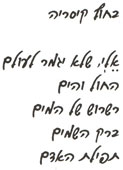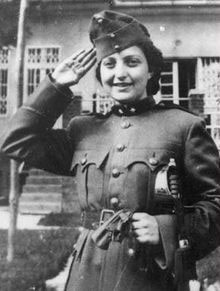|
Chanah Szenes (Senesh) Chanah Szenes |
||||
|
Bechof Keisariya At the Sea Shore of Caesarea
|
||||

Mein Gott Lass es niemals enden den Sand und das Meer das Rauschen des Wassers das Leuchten des Himmels des Menschen Gebet
Oh my God
Let It never end
The sand and the sea
The rush of the waters
The shine of the skiesw
The prayer of mankind
Oh!
Seigneur, mon Dieu
|
Chanah
Senesh was born in Hungary in 1921. Her father Bella Senesh was an author.
Twenty-three-year-old Hannah Senesh, a Hungarian Jew who emigrated to Palestine
in 1939 - where she studied agriculture. Later she joined the kibbutz Sedot
Yam Caesarea. At this time she wrote poems and also joined the underground
movement in Palestine - ,was one of the thirty-two Palestinian parachutists
the British dropped behind German lines to organize resistance and rescue
efforts. In January of 1944 she was sent to Yugoslavia and continued on
to her native Hungary. Before crossing the border in Hungary on June 7,
1944, to warn Hungarian Jews about the extermination camps, Senesh, a poet,
handed a poem to one of her companions. It ended with these lines: "Blessed
is the heart with strength to stop its beating for honor's sake. Blessed
is the match consumed in kindling flame." She was soon captured by
the Nazis due to an informer. Chanah Senesh was held 5 months in prison
where she was interrogated and tortured by the Nazis. She was sentenced
to death in November 1944 and faced a firing squad without a blindfold
and with her head held high. Her remains were brought to Israel in 1950
where she was buried with full state honors in the national cemetery on
Mt. Herzel in Jerusalem. Hannah Szenes has been the subject of novels, plays, and a motion
picture; she has become a symbol of courage, steadfastness,
and moral strength. Her writings have been published in many editions.
A village, Yad Hannah, commemorates her name.
Blessed
is the match that burned and set flames alight Blessed
is the flame that burned hiding in hearts Blessed
are the hearts that in honour knew how to cease
|
From
The Diary Chanah Senesh - October 27, 1938
|
||
